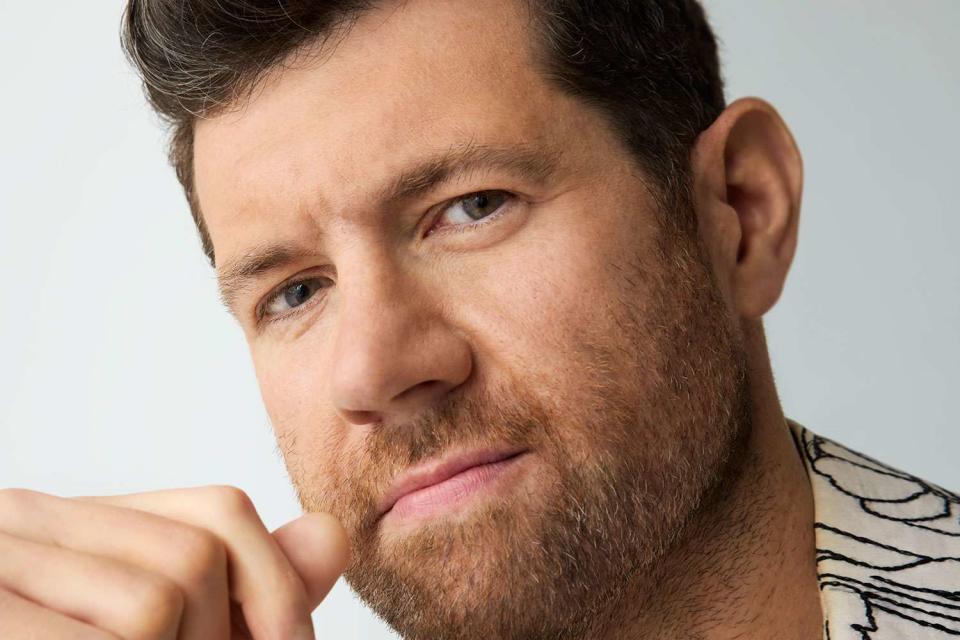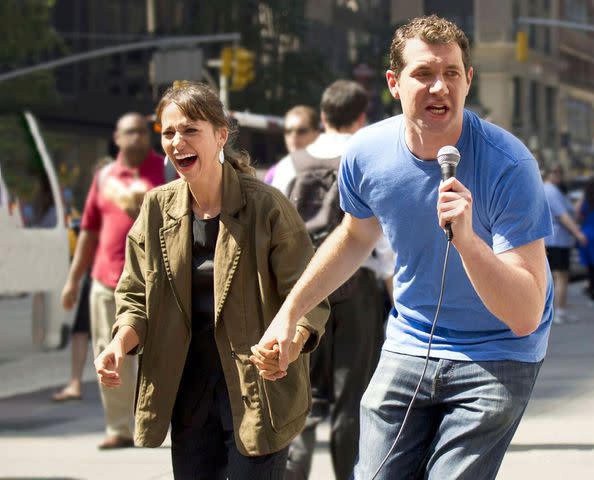Billy Eichner Looks Back on 20 Years of “Billy on the Street”'s“ ”'Gay Sensibility'
Talking to PEOPLE for LGBTQ+ Pride month, the actor, writer and comedian — and voice of Timon in 'Mufasa: The Lion King' — acknowledges his inadvertent activism

Ari + Louise
Billy EichnerBilly Eichner is the first to acknowledge that he was never trying to be a diversity pioneer.
But 20 years ago, when he did his first ambush interview video, which would become the wildly popular pop culture quiz show Billy on the Street, he was introducing the “gay comedic sensibility” to a broader audience.
In conversation with PEOPLE for LGBTQ+ Pride month, the writer and star of the 2022 rom-com Bros recalls that the moment happened in September of 2004.
"I made a Billy on the Street video, which was for a segment in my live show that I did in New York for years called Creation Nation," Eichner, 45, tells PEOPLE. "I had been doing this show with my friend Robin Taylor, also an actor. He was my sidekick and I had been over time developing this persona, this person who became irrationally angrier about pop culture and entertainment as the night wore on."
Then he had an idea. "Okay, what if we take this persona and put it out onto the street and force people to deal with it?"
It didn't come naturally to him, he says. "Like most actors, I'm shy. I'm not a wallflower, but to go out on the street and deal with real New Yorkers, this was not in my wheelhouse in terms of my comfort level."

Related: 'Bros' Star Billy Eichner Brings Back 'Billy on the Street' After Nearly 3 Years — with Paul Rudd!
"I had no idea what would come of this." What would come is pop culture history — and some LGBTQ+ visibility.
“It did introduce a new voice to some people,” he explains of the bit that became a pre-viral viral sensation and it's own show on Funny or Die. ("The only thing that made it happen is that the internet came along," he says)
“It created a bridge. Because queer people recognized this was a gay man’s voice. But straight people just watched me have a heated argument about who’s a better actress, Glenn Close or Meryl Streep, which, interestingly enough, was a type of comedy associated with straight men,” Eichner explains.

Angela Cranford/MSG Photos
August 2, 2012: Rashida Jones joins Billy Eichner to tape in midtown Manhattan for Billy on the StreetGrowing up in New York City, Eichner remembers the dearth of openly LGBTQ+ comedians.
“Things started to change slowly in the ’90s, exactly the time I began thinking of pursuing a career as an actor,” he says, “so I was looking for signs of hope.”
Eichner found that hope in actors like Nathan Lane, Rupert Everett and Sean Hayes. But his professional journey still had its bumps. “I had a manager who was inviting big talent agents to my live show, and she asked me to make it ‘less gay’ that month,” he says. “This was in 2006.”
Today, Eichner is astounded by the progress. He is set to appear in the forthcoming Netflix documentary Outstanding: a Comedy Revolution, the first feature-length documentary to explore the history of queer stand-up comedy, which posits the importance of LGBTQ+ stand-up as a driver of social change over the past five decades.
We see gender-fluid, nonbinary, trans comedians who are able to harness the power of this moment and step into " ‘mainstream’ spaces,” he says, citing performers like Alok Vaid-Menon and Dylan Mulvaney.
“We’re seeing that to a degree that has never existed before in the history of comedy, or the history of Hollywood, or the history of planet Earth.”
For more People news, make sure to sign up for our newsletter!
Read the original article on People.
